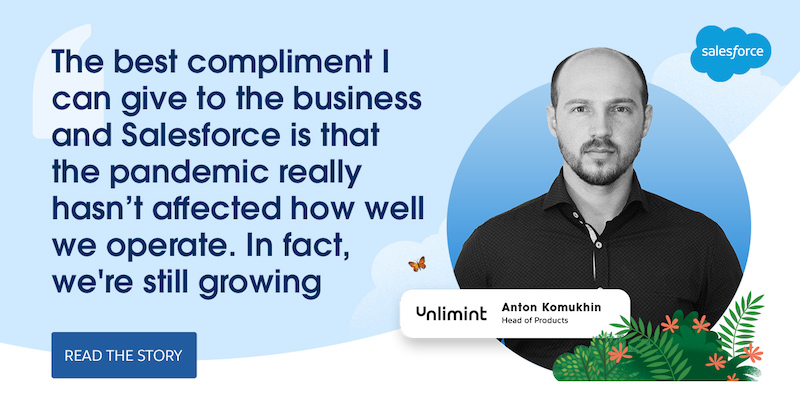"The best compliment I can give to the business and Salesforce is that the pandemic really hasn’t affected how well we operate. In fact, we're still growing." - Anton Komukhin, Head of Product Management, Unlimint
With clients like Visa, MasterCard, UnionPay International, and JCB International process payments, few businesses understand the need for scalable customer service like Unlimint does.
Specialising in payments processing, card services, and banking, Unlimint launched its US operations in 2018 as part of its global strategy to expand beyond Europe. That’s a lot of new potential customers. Customers need rock-solid, yet flexible processes to give them great experiences. One of Anton Komukhin’s key tasks is improving Unlimint’s internal and external processes to make that happen — no matter where customers are.
In this interview with Anton Komukhin, he talks about how Unlimint transformed its merchant onboarding process — to such an extent that even the COVID-19 pandemic couldn’t disrupt their customer service.
What effect has Unlimint’s rapid growth had upon its customer relationship processes and how have you evolved them?
AK: Scalability is certainly a big challenge for us. We have multiple products that we need to support to provide the best service for our customers. We currently have 10 offices around the world, and we’re opening new ones in Brazil, Mexico, Shanghai, and Hong Kong. It’s vital that we can scale that level of service and support that we’ve always provided in these new regions.
Obviously, how we manage our internal processes dictates all of our external interactions — including how we deal with merchants and potential clients.
“In order to support our growth, we embarked upon an ambitious journey to streamline our processes. ”
Before we started, we used disparate systems that often became overwhelmed. For example, when your email messaging systems are overloaded, you can’t provide the right level of customer service. Adopting a CRM has brought us the scalability and flexibility we need.
Salesforce covered most of our use cases out of the box, and we knew that we could build and tweak the CRM according to our needs at every moment. So far, it’s allowed us to remove the onboarding process’ reliance on previous systems, such as JIRA.
Now, all the relevant departments involved in the onboarding process use a single system, and they can find any information they need in Salesforce with a couple of clicks.
Was it easy to get everyone on board?
AK: People were used to the old way of working, even when they knew it was far from convenient. But over time, my colleagues realised that once they get used to Salesforce, communication and collaboration become much easier.
For example, if you need pre-approval from the risk team, you just create the record, add some additional information and assign it to the appropriate department. And you’re notified as soon as it’s been signed off. That’s the whole process. We’ve saved so much time that can now go towards reaching more customers, faster.
“Our sales leaders have started using personal dashboards to better understand how the team is performing.”
Let's say somebody needs approval from a risk team, which should take around three hours. We can incorporate a trigger that says if we’re on time, or out of scope. We can also count how many activities each salesperson is doing, how often, how long it takes them, and so on.
We can implement additional pop-ups or event reminders to help people understand what they need to do. And we can continually tweak our processes to increase efficiency across the business.
We can also track all those changes across sales, or the risk department, or Anti Money Laundering (AML), and fix any bottlenecks or bumps in the process.
How did Unlimint cope when COVID-19 hit?
AK: The best compliment I can give to the business and Salesforce is that the pandemic really hasn’t affected how well we operate. In fact, we're still growing.
The only drastic change was introducing remote working. Our main concern was whether we could continue working with the same level of efficiency.
Because we have offices all over the world, we’re providing education materials and education centres for our remote employees. We need to help them learn how to work effectively and, above all, stay safe.
“The company went fully remote during the lockdown and continued to operate efficiently. It was as smooth an experience as possible, given the circumstances.”
The fact we were already honing our internal and customer-facing processes meant everyone was prepared to continue working effectively during the pandemic.
What’s next for Unlimint?
AK: We’re really excited to continue honing our processes with Salesforce and our implementation partners at iTechArt.
Many of our internal systems are related to merchant onboarding. We’re planning to integrate all of these systems and have one endpoint — from there we can feed all the necessary information into the relevant departments.
We’re currently evaluating all of these systems and working with iTechArt to figure out how we want to integrate this within Salesforce. We want one system that allows us to centrally manage our merchant information so we can provide better and faster service.
We’re also continuing to figure out how to remove bottlenecks and drive consistently actionable data to feed our operations across the business.
Combining all of this in one place will be huge for our company — it’s the next big step in our digital transformation. We can’t wait to get started.
Learn how Unlimint helps businesses pay and receive funds globally with Salesforce!





